health WAY OF
BRAIN-BOOSTING
NOOTROPICS
+ 20 BRAIN TEASERS!
THE WELLNESS
GARDEN HERBS FOR HEALTH, BATH & BODY

ESSENTIAL OILS FOR YOUTHFUL SKIN
WHAT’S INSIDE

BRAIN-BOOSTING
NOOTROPICS
+ 20 BRAIN TEASERS!
THE WELLNESS
GARDEN HERBS FOR HEALTH, BATH & BODY

ESSENTIAL OILS FOR YOUTHFUL SKIN
WHAT’S INSIDE

A multivitamin’s purpose is to provide nutrients you need but don’t get enough of from foods. Yes, that includes vitamins and minerals. But, you also need phytochemicals.
Phytochemicals are factors that exist only in plants. They’re why doctors say we need five to nine servings of fruits and veggies per day.
Unfortunately, only 1 in every 10 Americans eat even close to that amount. And those who do, still miss some of

the most profound phytochemicals, because they’re found only in the world’s great superfoods, superior herbs and adaptogens.





Put simply, a multivitamin can’t do its job without a strong blend of these plants.
Our One ‘n’ Only™ family provides more of these foods and herbs than any other one-a-day multivitamin. Because of that, you’ll feel not just better, but also more energetic, relaxed and focused.* We guarantee it!

IF YOU USE A ONE-DAILY, MAKE IT COUNT. MAKE IT ONE ‘N’ ONLY™.
We all want more energy. To get it, we reach for caffeine, sugar and other stimulants. But they just make things worse.


What can help are superior herbs — plants that transform solar power into energies that holistic systems call prana or qi, this energy is then passed on to you when you use them.

Superior herbs have been used for millennia to build vitality, vigor and stamina. They provide clean, clear energy, so you feel more aware, more alert and more alive.*



EnergyPlus™ blends 14 superior herbs — and a full gram of spirulina — into an energy boost you’ll feel from the very first day.* EnergyPlus™. Pure. Holistic. Better.

EnergyPlus™ Has Won “Energy Product of the Year” Six Times — An All-time Record!


Magnesium is vital for 700 body functions. Yet, few of us get enough from food. To get more, millions use magnesium supplements. And, if you use a supplement, ionic magnesium is your best bet.

Ionic-Fizz™ Magnesium Plus™ delivers 300 mg of magnesium per serving — with 13 other


nutrients to help it work better. It comes in three delicious flavors — 100% natural and sugar free.



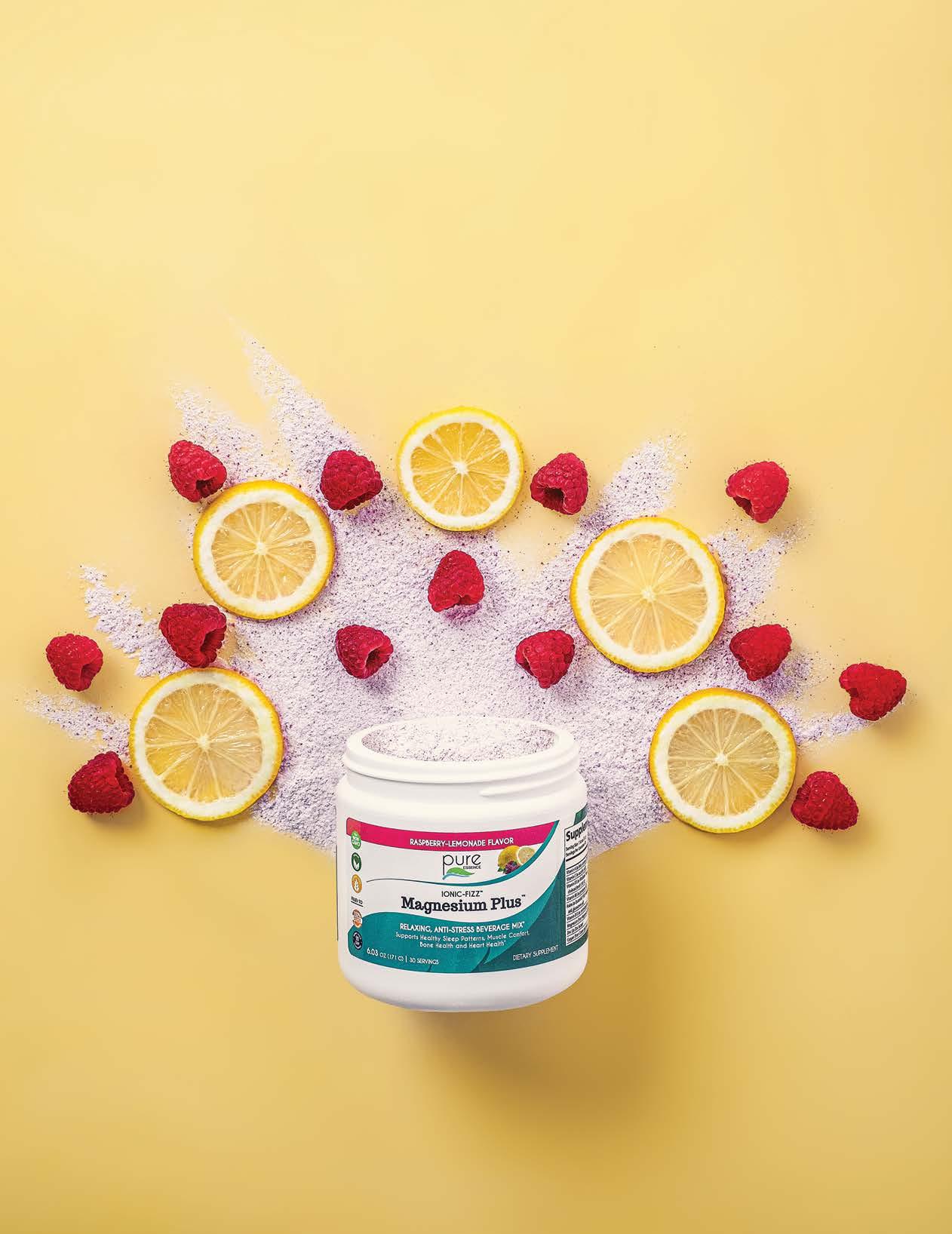
And, yes, they actually taste good!
For the most calming, soothing, natural stress support possible, don’t get plain old magnesium by itself.* Hire the whole magnesium team with Ionic-Fizz™ Magnesium Plus™.
PUBLISHER
Jery Cochern
EDITOR-IN-CHIEF
P.J.S. Dougherty
CONTRIBUTING WRITERS
Bridget Dunn
Lisabeth Fauble
Megan Moore
Leigh Salazar
PRODUCTION MANAGER
Claire Ramer
PUBLICATION DESIGN, PRODUCTION AND MANAGEMENT:
PRESIDENT/PUBLISHER
Brian E. Rowland ASSOCIATE PUBLISHER McKenzie BurleighJery with his family — Fellipe, Margareth, Katherine, Marianna, Elizabeth, Jery and Gabe

Spring has sprung! It’s a time of reawakening, rejuvenation and renewal. It’s also the perfect time to appreciate nature and enjoy your life. In this Way of Health issue, we’ve got some great tips to help you do all that while feeling your best!
VICE PRESIDENT / PRODUCTION AND TECHNOLOGYDaniel Vitter
CUSTOM PUBLISHING MANAGER Sara Goldfarb
CREATIVE DIRECTOR Jennifer Ekrut
SENIOR PUBLICATION DESIGNER Saige Roberts
PRODUCTION EDITOR Paige Aigret
CONTACT WAY OF HEALTH MAGAZINE:
Phone: (888) 254-8000
Email: info@wayofhealthmagazine.com
Nothing appearing in Way of Health may be reprinted without the publisher’s written consent. Way of Health reserves the right to reject any advertising at our discretion. Advertiser and advertising agencies assume liability for all contents of advertising and for any claims arising therefrom. The opinions expressed by the authors and contributors of Way of Health are not necessarily those of the publisher or the health food stores distributing this magazine. Way of Health is intended for educational purposes only and does not provide medical advice or attempt to diagnose or treat any illness. Do not substitute Way of Health for the advice of your healthcare practitioner. Way of Health readers should consult a licensed healthcare professional before beginning any diet, nutrition or exercise program. The products discussed in Way of Health are not intended to treat, diagnose or prevent any disease. Use information in Way of Health at your own risk. Way of Health welcomes contributions, questions and personal stories related to health. All letters, photos, manuscripts, etc. sent to Way of Health will be considered as intended for publication and Way of Health reserves the right to edit any letter or manuscript as we see fit. Photos submitted have an implied waiver of copyright. Address all correspondence, address changes and other inquiries to Way of Health magazine, 6155 S. Sandhill Rd., Suite 200, Las Vegas, NV 89120, USA. Copyright© 2023 by Apollo Press, Inc. All rights reserved. Publishing Partner: Rowland Publishing, Inc. PRINTED IN THE USA
Are you sniffling and sneezing, struggling with seasonal allergies? Check out our Natural Allergy Relief guide on Page 14 to learn about nutritional supplements and natural health products that can help you breathe easy again. This will be especially helpful if you’re a gardener! The Wellness Garden feature on Page 30 has some great tips on how to integrate beautiful and useful traditional herbs into your landscape this season.
On Page 20 you can learn about nootropics, the emerging class of brain boosters that can enhance virtually every aspect of your day-to-day mental performance. Our brainy content includes a Lemon Oatmeal Lion’s Mane Mushroom recipe that blends one of today’s most remarkable nootropics into a light, moist and fluffy muffin that’s awesome for mood and mental clarity. Then give your brain a workout with 20 challenging brain teasers on Page 28. How many can you get correct?
Spring is a great time to turn back the clock, so our departments in this issue focus on anti-aging. Nutrition 101 on Page 11 gives you the lowdown on how antioxidants can help protect your cells from the ageaccelerating effects of nasty free radicals. Don’t forget to try our delicious Ginger Antioxidant Smoothie Bowl recipe, jam-packed with anti-aging phytochemicals, on Page 12. Self-care on Page 49 introduces you to a natural, cost-effective way to promote youthful and healthy skin: essential oils.
On Page 40, we discuss three classes of herbs — Rasayanas, Superior Tonics and adaptogens — that help to unleash true radiant health. And if you’re one of the 70% of women who has experienced a yeast infection, be sure to study the natural options to help keep you in the clear on Page 45. Ready to get healthy and feel great inside and out? Just turn the page!
Give your brain a workout with 20 challenging brain teasers on Page 28."
JERY COCHERN PUBLISHER

Read on for weight loss research, longevity tips, smoothie trends and the best thing to hit the produce department since organic certification.
The global smoothie market is projected to hit $10.9 billion in five years,1 powered by today’s plant-based, dairy-free, clean-eating trends. Non-dairy is hot, with coconut, almond, oat, hazelnut, rice and other plant milks emerging as popular smoothie ingredients. Chia seeds add sumptuous thickness to smoothies, along with healthy fats, fiber and calcium. Options like monk fruit, stevia and maple syrup are replacing simple sugars and artificial sweeteners. And spicy smoothies for metabolism, with ginger and cayenne pepper, are an exciting new segment. Whether you want freshly made smoothies or organic ingredients for your own creations, a health food store is your best bet.


Do you buy organic, sustainable, clean-label and eco-friendly foods and other products? Then the fastgrowing regenerative-agriculture movement might be for you. Also known as climate-smart agriculture, regenerative farming works in harmony with nature to nourish the soil and fight climate change; as well as promoting economic stability, fair trade and social responsibility. Regenerative
farming uses techniques like crop rotation, crop diversification, mixed farming (livestock and crops), terrace planting and cover crops — all of which combine to enrich the soil, use less water, reduce pesticides and fertilizers and prevent erosion.2 A Regenerative Organic Certified program is now underway, so keep your eye out for these earthhealthy products in the future.
Here’s another great reason to turn that frown upside down: A new study published in the Journal of the American Geriatric Society suggests that optimism appears to be linked to longevity. In the study, researchers evaluated data on optimism and health status collected from over 150,000 women between the ages of 50 and 70. After analysis, researchers found that women with the highest levels of optimism lived 5.4% longer (about four and a half years) than the most pessimistic women. Researchers also linked high optimism to exceptional longevity of 90-plus years. Researchers attributed this outcome to optimism’s associations with overall healthier day-to-day behaviors.3


Heard of the Mediterranean diet? Associated with heart health, mental clarity, weight loss and longevity, it has very little sugar, meat or processed foods. Instead, it emphasizes abundant organic vegetables, fruits, nuts and olive oil, plus moderate intake of fish and red wine. Now, a modified “green” Mediterranean diet is boosting weight loss by replacing red meat with plant-based proteins and phytochemical-rich greens
One recent study found that a green Mediterranean diet group consuming 3–4 cups of green tea and one green smoothie (made with protein from duckweed or water lentils) per day reduced visceral fat by 14%, compared to 7% in a Mediterranean diet group and 4.5% in a healthy diet group.4 DUCKWEED,
We’ve got naturalyourhealth news right here!





Nearly every health practitioner suggests a multivitamin during pregnancy. But, most multivitamins lack what you need most. While all foods contain vitamins and minerals, phytochemicals exist only in plants. And just 10% of women eat enough fruits and veggies to get the phytochemicals they need.

One ‘n’ Only™ PreNatal delivers a full array of vitamins and minerals, and adds phytochemicals through a vast base of superfoods, sprouts, fruits and botanicals. It even includes ginger to make your mornings better.* The bottom line? One ‘n’ Only™ PreNatal helps you feel more energetic, more radiant and just plain better. And, when you feel better, baby does, too!*



Because bacteria and viruses never take a day off, you’re constantly under attack. To stay healthy, you have to win every battle, every day.
Obviously, that’s impossible. But, you can improve your odds — with IMMUNIN-6™!*

Elderberry is famous for supporting a healthy immune response. Andrographis is less known in the

West but is an absolute superstar of immune support in the Ayurvedic tradition.




IMMUNIN-6™ combines the world’s most potent elderberry and Andrographis extracts with vitamin C, vitamin D3, zinc and selenium to create an exquisite immune support system.*
IMMUNIN-6™ — for a fighting chance.
You’ve seen the word “antioxidants” everywhere: daytime television, product labels, skin creams, esteemed scientific journals and everything in between. But what are antioxidants, and how might they benefit health?
Simply put, antioxidants are substances that may reduce cell damage caused by free radicals. By protecting cells throughout the body, antioxidants are believed to support overall wellness, especially in the context of healthy aging. Let’s take a closer look at how antioxidants work.


In nature, everything seeks balance. On an atomic level, balance is achieved when electrons are paired. Free radicals are atoms and molecules that have one or more unpaired electrons. This unpaired electron makes them unbalanced and volatile.
Because they are one electron short of stability, free radicals attack neighboring molecules, smashing up against them to “steal” the electron they need to achieve balance. The victim of this hit-and-run, however, is now missing an electron and becomes a new free radical. This process, repeated millions of times per second, is called oxidative stress.
Some scientists believe free radicals’ smashing action damages cell membranes, DNA, proteins and powerplant mitochondria, causing cells to mutate, malfunction and die. According to The Free Radical Theory of Aging, pioneered by Dr. Denham Harman in 1954, free radicalinduced cellular damage accelerates the aging process.1
On the surface, free radical cell damage may be seen as skin damage: wrinkles, sagging and lost elasticity. It also leads to the widespread, chronic inflammation that is a setup for atherosclerosis, cancer, inflammatory joint disease, asthma, diabetes, kidney diseases, degenerative eye conditions and other diseases.
When you slice open an apple, it turns brown. This is oxidation in action. Lemon juice, which contains antioxidant vitamin C, quenches free radicals and blocks oxidation.
Free radicals are unavoidable. They are a natural byproduct of the oxygen “burning” that gives us energy. Free radicals also come from external sources. Stress, pollution, ultraviolet rays, junk food, pesticides, heavy metals and alcohol can all elevate levels of free radicals in the body.2
Here’s the good news: Researchers suggest that despite free radicals’ significant influence on health and aging, their damage may be controlled with adequate antioxidant intake — potentially enhancing both quality of life and lifespan.3


Antioxidants are special because they can freely donate electrons to quench unstable free radicals without becoming free radicals in the process.
When you slice open an apple, it turns brown. This is oxidation in action. Toss sliced apples in lemon

juice, however, and they do not turn brown — because lemon juice contains vitamin C, a powerful antioxidant that quenches free radicals and blocks oxidation.
There are hundreds of different antioxidants that, like vitamin C, neutralize (or balance) free radicals. Some are more effective than others for specific concerns. But all are associated with wellness and anti-aging on some level. So how can you get them?
Scientists have identified vitamins A, C and E along with copper, zinc and selenium as antioxidant micronutrients.4 A healthy diet and high-quality multivitamin supplement can help ensure that you get these foundational antioxidants every day.
Researchers also encourage a high intake of antioxidant-rich fruits, vegetables and plant foods. These foods not only contain the vitamin and mineral antioxidants, but thousands of others, called phytochemicals.5 Eating a broad spectrum of colorful fruits and vegetables — “eating the rainbow” — will help ensure you get the levels of phytochemical antioxidants you need.
Some examples: Red foods like tomatoes supply antioxidants including fisetin for brain health and lycopene for breast and prostate health.6 Greens like kale and spinach supply carotenoid antioxidants, lutein and zeaxanthin, which protect the eyes and
skin.7 Blue-purple foods like blueberries, black currants and grapes supply polyphenols, anthocyanins and other antioxidants that support cognition, vision, arterial and cardiovascular health.8
Moving to herb and superfood examples, bright orange-yellow turmeric root supplies a powerful complex of antioxidants called curcumin that has inflammation-soothing properties. Spirulina is a green algae superfood that’s been singled out by researchers for its strong antioxidant properties.9 Ginger root has very high levels of antioxidants including phytochemicals called gingerols that support the immune system.10 In fact, virtually all of the world’s most profound adaptogenic herbs, like ashwagandha, astragalus, schisandra, rhodiola, bacopa, holy basil and so on, work largely through their antioxidant activity.
Whether you consume them for anti-aging, specific health concerns or general wellness, a diverse network of antioxidants may be your best strategy for success. Focus on a rainbow of plant foods and buy organic if possible. Organic foods have higher levels of some antioxidants, while their conventionally farmed counterparts may contain free radicals (pesticides, herbicides) that you are trying to avoid.11 ■

INGREDIENTS
½ cup pomegranate arils
½ cup frozen raspberries
1 scoop Ionic-Fizz™
Magnesium Plus™
1 frozen pear
1 frozen mango

1 frozen banana
½ cup coconut water
1 teaspoon fresh ginger root, grated
Total Time: 5 minutes
Servings: 1
❶ In a blender, combine the pomegranate arils, frozen raspberries and Ionic-Fizz™ Magnesium Plus™. Once smooth, pour into a smoothie bowl.
❷ Now, blend the frozen pear, mango and banana with the coconut water and ginger. If it is too thick for your taste, add additional coconut water until you achieve the desired consistency. Once combined, add to the smoothie bowl, swirling the two together.
❸ Top with desired toppings, such as granola, raspberries or additional pomegranate arils.
*Note: Buy all organic ingredients if possible.
8. https://www.maine.gov/mdot/challengeme/topics/2019/aug 9. https://www.sciencedirect.com/science/article/pii/S277242712200033X 10. https://www.ncbi.nlm.nih.gov/books/NBK92775 11. https://pubmed.ncbi.nlm.nih.gov/20359265
If a little is all you need, LifeEssence™ is not for you. LifeEssence™ has more vitamins. More superfoods. More herbal extracts. More co-nutrients. More everything.


And, those men’s and women’s formulas with just a bit more zinc or a tad more calcium? Not LifeEssence™! Instead, you get complete nutrient packages to support prostate health, hormone balance and more.*


If your diet is less than ideal, make your multivitamin count. LifeEssence™ — like a meal in a bottle!*



Around 30% of adults and 40% of children in the U.S. experience seasonal allergies from pollen released by grasses, weeds, wildflowers and trees.1 Allergy symptoms can range from mild to severe, but they actually stem from the body’s natural protective reaction to airborne irritants that enter the body.
These irritants cause the body to release histamines, which trigger common allergic responses like runny or stuffy nose; sneezing; itchy throat, nose and ears; and red, watery eyes. If symptoms become severe enough, they may lead to mouth-breathing, sleep apnea, snoring and low energy.

Many people use over-the-counter antihistamines to address allergy symptoms. However, these therapies may have undesirable side effects, including sleepiness, dry mouth and eyes, headache and dizziness. Some antihistamine side effects may even mimic allergy symptoms like cough and sore throat. Fortunately, you can minimize allergy symptoms and avoid side effects by using the following natural approaches to allergy relief.
Burdock is a root vegetable with edible stems and leaves common in Japan, China and Korea. Burdock supplements are thought to help minimize allergy symptoms by regulating histamine levels in the body. One 2021 study in the Journal of Food Biochemistry found that burdock extract “exerts a strong antiallergic activity” in rat and in vitro testing and could help with seasonal allergies.2 Pregnant women should not eat or take burdock as it may impact fetal development 3
Stinging nettle has been used as a holistic remedy for thousands of years throughout North America, Europe and Africa. Many claim it helps with allergy symptoms. While the fine, prickly hairs on nettle’s stems and leaves contain histamines that cause irritation when touched, nettle supplements provide natural allergy relief
WHETHER THE CULPRIT IS SEASONAL ALLERGIES, DUST, PET DANDER, MOLD, MITES OR OTHER IRRITANTS, NATURAL RELIEF STARTS WITH A QUICK TRIP TO YOUR LOCAL HEALTH FOOD STORE.


Sometimes, your immune system gets confused, seeing harmless proteins as dangerous invaders. To right them, it sends out histamines, triggering sneezes, sniffles, rashes or red, itchy eyes.* But these things don’t have to make you miserable. Because now, there’s AllerFree™.*
AllerFree™ combines powerful enzymes with quercetin, burdock root and stinging nettle leaf to support a more comfortable, nondrowsy immune response.* For seasonal changes or year-round support, you’ll be thrilled with AllerFree™.* As with all Pure Essence products, it’s guaranteed to your complete satisfaction.







by reducing symptoms like runny nose, eye discomfort and sneezing. Nettle extract has been shown to work by modulating histamine release in the body and soothing inflammatory responses.4 Bonus: nettle supplements may also help with achy joints.
Vitamin C is a powerful antioxidant with many benefits. But did you know it can also work for natural allergy relief? Oxidative stress can exacerbate symptoms of environmental allergies. As an antioxidant, vitamin C can reduce oxidative stress in the body, helping to ease allergy symptoms. And vitamin C’s support for immune function may also regulate histamine responses to environmental stimuli.5
Vitamin D is another essential vitamin needed for good immune function. Mouse studies have found that vitamin D supplementation may help reduce allergy discomfort in the nose and throat.6 Less irritation could translate to improved allergy symptoms like sneezing, coughing and scratchy feelings in the throat and nose.
Women who took vitamin D supplements while pregnant saw a 25% reduced risk of their children developing asthma or chronic breathing problems.7 Asthma and allergies are often activated by the same triggers, dust mites,
dander and pollen, so vitamin D supplementation could help you breathe easier during allergy season.
Magnesium and zinc could help reduce allergy symptoms, too, particularly if you are deficient in these nutrients. Magnesium helps modulate inflammation and protects against oxidative stress; both these factors, when elevated, are linked to more severe allergy symptoms.8 And zinc has been found to influence histamine release by the immune system, helping with allergy symptoms like itchy throat, nose and eyes; sneezing; and runny nose.9
Allergies can drain your energy, and fatigue is a genuine allergy symptom. B vitamins could help maintain energy levels when dealing with other allergy symptoms, especially if you’re already deficient in B vitamin levels. B12 specifically supports brain and cell function and can support energy levels in people with insufficient levels of B12 in the body.10 B vitamins also help the
body liberate energy from food by supporting enzyme function in the digestive tract.
Digestive enzymes help break down food in the digestive process. The pancreas produces these enzymes naturally, but some people’s bodies don’t make enough of them. When enzymes are insufficient to break down food completely, the immune system views the leftover particles as a threat and begins an allergic reaction.11 Supplementing digestion with plant enzymes between meals may help reduce the frequency and severity of allergy symptoms and calm immune overreactions.
Studies have shown that those with allergies often have subnormal levels of amylase, an enzyme that digests starches. It is often recommended for those with histamine intolerance. Protease enzymes may help manage inflammation, which is always helpful in dealing with allergic response and may also digest proteins that trigger allergic reactions.
Asthma and allergies are often activated by the same triggers. Some supplements may help you breathe easier through both of these immune challenges.
 PHOTO BY PHOTOGRAPHER / ISTOCK / GETTY IMAGES PLUS
PHOTO BY PHOTOGRAPHER / ISTOCK / GETTY IMAGES PLUS
If you live in a dry climate, consider using a humidifier to further impede airborne allergens.


Quercetin is a flavanol, a sub-group of protective polyphenols, that helps combat allergy symptoms on many fronts. Quercetin’s antioxidant properties help to support the immune system, calm inflammation, and regulate histamine release. One study found that quercetin also decreased levels of inflammatory cytokines.12
Quercetin has been shown to help with seasonal allergies and food allergy reactions. Raw onions and broccoli contain high levels of quercetin. It is also found in apples, berries, grapes, red wine and black tea. Another study found quercetin influenced the release of mast cells, a type of cell involved in allergic reactions.13
People commonly take 500 milligrams of common quercetin orally, twice a day. A wellrounded diet filled with lots of quercetincontaining fruits and vegetables like kale, tomatoes, cherries, olive oil, nuts and seeds can provide you with up to 500 milligrams of quercetin from natural food sources. The herbs St. John’s Wort and Ginkgo Biloba also contain quercetin.14
Using a neti pot filled with saline solution can help clear congestion and soothe rough, raw sinus cavities and airways for natural allergy relief. The Advanced ENT & Allergy Center in Colorado suggests taking a shower before bed to rinse off any pollen and other allergens you may have attracted during the day.15
Keep windows closed during high pollen days and use an air purifier to filter allergens from the air inside your home. Change the filter regularly to avoid re-releasing airborne allergens. If you live in a dry climate, consider using a humidifier to further impede airborne allergens and provide comfort to dry, itchy ears, eyes, nose and throat.
Depending on your allergies, your symptoms may feel worse at certain times of the day. Individual plant pollens peak at specific times, so you can still enjoy the great outdoors if you plan activities accordingly. The American Academy of Allergy, Asthma and Immunotherapy offers a free online tool for calculating daily and hourly pollen counts in your local area. ■
4. https://pubmed.ncbi.nlm.nih.gov/19140159 5. https://www.ncbi.nlm.nih.gov/pmc/articles/PMC5707683 6. https://onlinelibrary.wiley.com/doi/full/10.1111/cea.12122 7. https://journals.plos.org/plosone/article?id=10.1371/journal.pone.0186657 8. https://www.healthline.com/nutrition/magnesium-benefits 9. https://naturalallergytreatment.com.au/does-zinc-deficency-cause-allergies 10. https://www.hsph.harvard.edu/nutritionsource/vitamins/vitamin-b 11. https://nutritionforseizures.com/how-digestive-enzymes-are-related-to-food-allergies 12. https://www.ncbi.nlm.nih.gov/pmc/articles/PMC6273625 13. https://pubmed.ncbi.nlm.nih.gov/18187018 14. https://www.webmd.com/vitamins-and-supplements/quercetin-uses-and-risks 15. https://www.advancedentdenver.com/blog/allergy-fatigue

Texts. TikTok. Email. Stress. Pressure. Strain. It’s so hard to focus. And without focus, life can lose meaning. Thankfully, nature can help!
L-theanine (from green tea) improves focus, supports learning, reduces stress and promotes relaxation. Adaptogens do the same things, but in different ways. When combined, adaptogens and L-theanine make each other better. CalmEssence™ blends L-theanine, ashwagandha, schisandra, rhodiola and more to support the clear, calm focus you need.* Find your focus … with CalmEssence™.*







More people than ever are nourishing their brains with supplements, and with good reason. Although brain health is often associated with seniors, researchers have suggested that cognitive abilities may begin to decline as early as age 30.1
Beyond brain health, optimizing the brain is increasingly recognized as one step that can help many aspects of life: learning, communicating, competing, strategizing, innovating, working out and more. Let’s look at the benefits of today’s top nootropics that are helping to unlock the brain’s true potential.
Memory is far more dynamic than remembering where you left your car keys. And while Ginkgo biloba has always been a go-to herbal supplement for memory, it’s not necessarily the best you can take.
Phosphatidylserine (PS) is a nootropic that helps with brain health in many ways, including supporting neurogenesis: the creation of new brain cells. PS’s versatile support appears to translate into far-reaching memory benefits. Researchers suggest PS may help to encode and store short-term memories, consolidate long-term memories and
Remember memory pills? Early brain supplements were primarily formulated for age-related brain concerns. But now, a new class of brain-boosters called nootropics can do far more. Supporting focus, attention, mood, mental energy, clarity and many other cognitive functions, today’s top nootropics can help everybody to excel.



retrieve memories (recall).2 It has also been shown to improve delayed recall memory in seniors.3
Additional PS benefits for mood, stress and sports-related cognitive function have been noted by researchers, making it a powerful multi-tasker for any nootropic regimen.4,5
Learning is another aspect of memory that may be enhanced with nootropics. Bacopa monnieri is an Ayurvedic adaptogen herb in the Medhya Rasayana class, traditionally used to support cognition. Known as a learner’s nootropic, it has been suggested to slow down the rate at which we forget newly acquired knowledge.6 It also supplies neuroprotective activities that may
help with age-associated memory problems.7 In one study, researchers reported that supplementing with Bacopa monnieri for 12 weeks was associated with significant improvements across verbal learning, memory acquisition and delayed recall.8
Because it is an adaptogen herb, Bacopa monnieri also has natural stress-fighting properties that can help students of all ages to stay balanced through studying, exams and everything in between.
The brain is an energy-intensive organ; it consumes about 20% of the body’s total energy supply.9 When the brain is low on energy — due
to factors like mind-body stress, misfiring mitochondria (cells’ power plants), and suboptimal blood flow to the brain — cognitive symptoms like brain fog, mental fatigue, and slow processing may manifest. In addition, longer-range brain health problems are often linked to problems with energy metabolism.10

If you’ve ever felt like your brain is running low on gas, the nootropic acetyl L-carnitine (also called ALCAR) may help. ALCAR is an antioxidant that supports mental energy by “fueling up” brain cells’ mitochondria power plants with long-chain fatty acids that are “burned” for energy. ALCAR also promotes acetylcholine, a key brain chemical for memory and mental performance.
In one meta-analysis, researchers reported that ALCAR improved mild cognitive impairment and

ASHWAGANDHA HAS BEEN ASSOCIATED WITH NOOTROPIC BENEFITS FOR MENTAL ENERGY, PROCESSING SPEED, MEMORY, ATTENTION AND MOOD.
If you wake at night with the need to “go,” you’re in good company. Half of men aged 51 to 60 — even more over 60 — are right there with you. But, you can get off the merry-go-round.

In clinical studies, 60 to 180 mg per day of beta-sitosterol increased urinary flow, decreased residual bladder volume and improved International Prostate Symptom Scores (IPPS).*


ProstateEssence™ delivers 180 mg of beta-sitosterol, plus vitamin D3, zinc, selenium, trace minerals and herbs used for prostate support by holistic health systems.*



So, cut down — way down — on those nightly curtain calls. Get the most complete prostate support ever with ProstateEssence™!*

Want a brain boost? Lion’s mane is treasured for supporting cognizance, memory, clarity, focus and mood. It also supports a healthy immune response.*


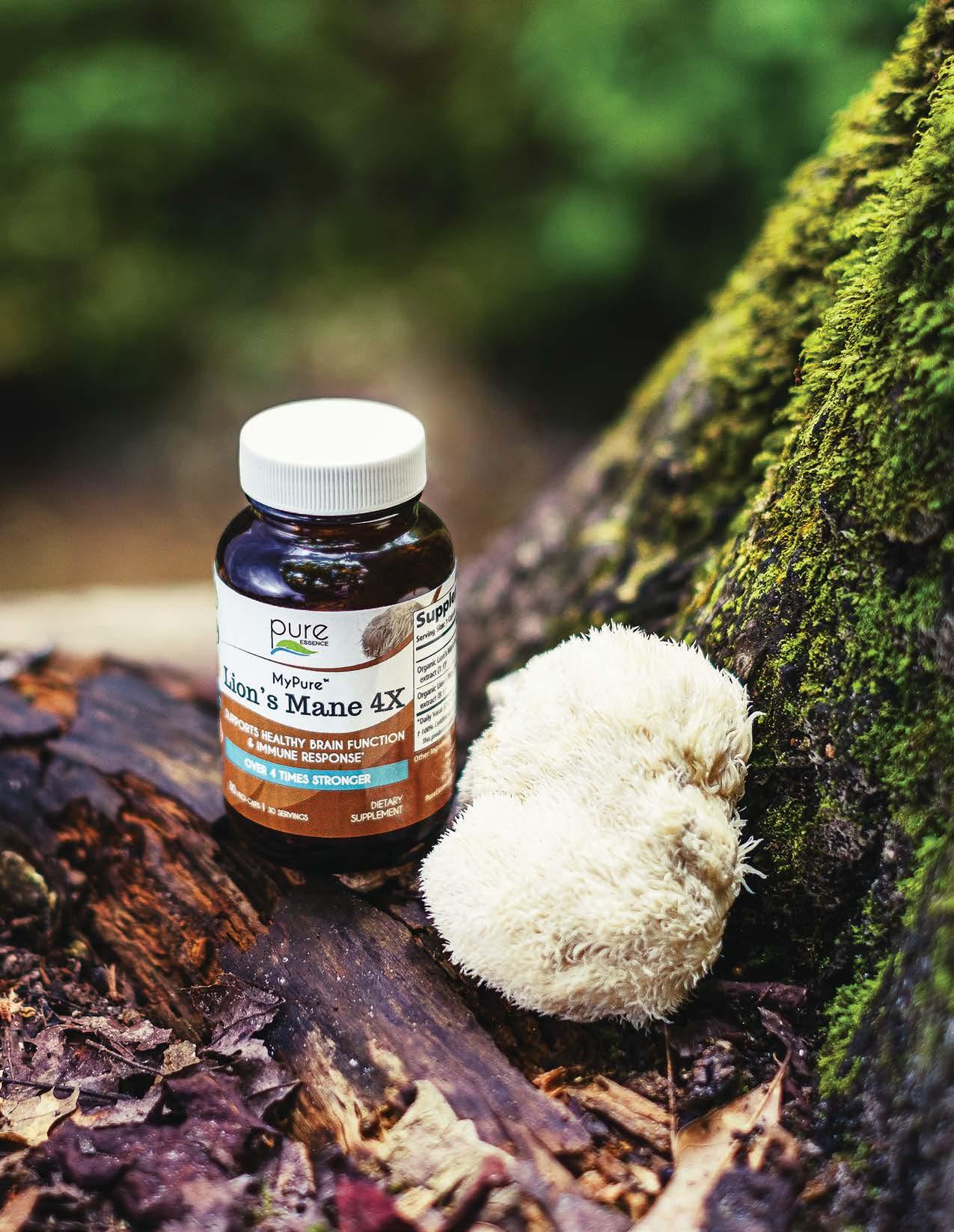
But with a jillion choices out there, which lion’s mane should you use?
The answer is MyPure™ Lion’s Mane 4X. Made from 1:1 and 8:1 extracts of 100% organic, non-GMO, lion’s mane fruiting bodies, it’s the strongest lion’s mane formula you’ll find. Yet, it costs only slightly more.



Try MyPure™ Lion’s Mane 4X — the smartest mushrooms ever.*

had a significant positive effect on memory, attention and higher intellectual functions.11


Traditional adaptogen herbs boost mental energy via another important pathway: by fighting the vitality-sapping effects of acute and chronic stress. Ashwagandha and Rhodiola rosea are cornerstone adaptogens prized by professionals, athletes, competitors and high achievers, partly due to their ability to energize mind-body performance.
In clinical research, ashwagandha has been associated with nootropic benefits for mental energy, processing speed, memory, attention and mood. It has also been suggested to promote overall brain health via neuroprotective and inflammationmodulating bioactivities.12,13
In Rhodiola rosea research, a single serving of the adaptogen was found to produce a stimulating effect that began within 30 minutes
and lasted four to six hours.14 Rhodiola has also been suggested to promote mind-body performance and exert a significant antifatigue effect, especially under stressful conditions.15-17
It can be hard to think clearly when you’re feeling down, dejected or otherwise apprehensive. Lion’s mane mushroom may help.
One of the only mushrooms on the planet that is considered a nootropic, lion’s mane is believed to work by increasing the brain’s natural production of nerve growth factor (NGF).18 Healthy NGF levels help to connect and organize brain cells, maintain brain plasticity, surround neurons in protective myelin and more. Low NGF levels, on the other hand, have been linked to mood problems.
NGF has a large molecular weight that cannot cross the blood-brain barrier. Lion's mane mushroom's

active nootropic phytochemicals called hericenones and erinacines have a low molecular weight, enabling them to cross the bloodbrain barrier and stimulate NGF synthesis directly in the brain.

Lion’s mane mushroom’s brainhealthy bioactivities may support healthy brain structure while promoting a brighter, more balanced mood. In one study, subjects were given either a placebo or lion’s mane mushroom cookie every day for four weeks and were tested for a range of mood metrics. At the study’s conclusion, researchers suggested that lion’s mane mushroom appeared to help with mood and apprehension.19
Gotu kola is another natural nootropic that may help with mood. An Ayurvedic Medhya Rasayana herb used as a brain tonic for cognition, gotu kola supplies antioxidant phytochemicals called triterpenes thought to help protect brain cells, support blood vessel flexibility and promote circulation to the brain.
PROMOTING A BRIGHTER, MORE BALANCED MOOD.
Lion’s mane mushroom is one of today’s hottest nootropics, but it’s also been used in Asian culinary traditions for centuries. These lemony, lightand-fluffy muffins serve as the perfect vehicle for lion’s mane’s brain-boosting nutrition and rich, savory-sweet flavor.
1¾ cups oat flour
½ teaspoon baking soda
Pinch of salt
2 eggs
½ cup honey
½ cup coconut oil, melted and cooled
¼ cup milk of choice
1 teaspoon vanilla extract
2 tablespoons lemon juice
Zest of 1 lemon

2 tablespoons chia seeds
12 capsules MyPure™ Lion’s Mane 4X
*NOTE: Buy all organic ingredients if possible.
❶ Preheat oven to 350 F and spray muffin pan with nonstick spray or use muffin liners. Set aside.
❷ Combine the oat flour, baking soda, salt and the powder from the MyPure Lion's Mane capsules together in a small mixing bowl.
❸ In a separate large mixing bowl, blend the eggs with the coconut
Prep Time: 15 minutes
Cook Time: 20–25 minutes
Total Time: 40–45 minutes
Servings: 6 large or 12 regular
oil, honey, vanilla extract, milk, lemon juice and lemon zest.
❹ Add dry ingredients to the wet ingredients. Stir a few times using a spatula. Add in the chia seeds. Fold everything together gently just until combined.
❺ Spoon the batter into the muffin pan, filling them all the way to the top. Lightly

sprinkle them with coconut sugar and lemon zest if desired.
❻ Bake for 20–25 minutes or until a toothpick inserted in the center comes out clean.
❼ Allow the muffins to cool for five minutes in the muffin pan, then transfer to a cooling rack to continue cooling. Serve and enjoy!
Gotu kola also seems to help with a range of cognitive concerns including memory, clarity and brain aging. One study in particular highlighted gotu kola’s potential to optimize emotional well-being, with researchers reporting the herb shows promise for easing apprehension and supporting emotional balance.20
As we age, cell damage from toxic free radicals builds up and degrades brain cells. This damage is linked to mild cognitive concerns affecting memory, mental clarity, thinking skills and overall brain function.21


Healthy brain structure and sharp cognitive function may be maintained with antioxidants that fight free radical damage. There are many antioxidants for brain health. Two cutting-edge options are fisetin and alpha lipoic acid (ALA). A botanical antioxidant found in apples, cucumbers, grapes and strawberries, fisetin has been regarded as a neuroprotective agent in early research.22 ALA is known as the “universal antioxidant” because it can cross the blood-brain barrier and is fat soluble, so it can fight free radicals in all parts of the brain. ALA has been shown to assist with agerelated memory concerns, with researchers suggesting it may help to slow cognitive decline.23
Traditional brain pills are now evolving into multifaceted nootropics that optimize our most powerful organ for whole-life performance. Combining nootropics, a practice known as stacking, expands their benefits even further — helping you maintain a sharp, youthful and healthy brain by fighting stress, countering aging, maintaining energy, bolstering mood and more. And the best part? The right nootropics can not only boost brain power in the here-and-now, but nourish your brain for crystal-clear cognition well into your future. ■
REFERENCES 1. https://www.ncbi.nlm.nih.gov/pmc/articles/PMC2683339 2. https://pubmed.ncbi.nlm.nih.gov/25933483 3. https://pubmed.ncbi.nlm.nih.gov/21103034 4. https://pubmed.ncbi.nlm.nih.gov/11842886 5. https://www.ncbi.nlm.nih.gov/pmc/articles/PMC1997116 6. https://pubmed.ncbi.nlm.nih.gov/12093601 7. https://pubmed.ncbi.nlm.nih.gov/22074576 8. https://pubmed.ncbi.nlm.nih.gov/20590480 9. https://www.pnas.org/doi/10.1073/pnas.172399499 10. https://www.pnas.org/doi/10.1073/pnas.0903563106 11. https://www.ncbi.nlm.nih.gov/books/NBK69816 12. https://pubmed.ncbi.nlm.nih.gov/28471731 13. https://www.ncbi.nlm.nih.gov/pmc/articles/PMC3573577 14. https://pubmed.ncbi.nlm.nih.gov/16261511 15.https://pubmed.ncbi.nlm.nih.gov/21036578 16. https://pubmed.ncbi.nlm.nih.gov/12725561 17. https://pubmed.ncbi.nlm.nih.gov/10839209 18. https://pubmed.ncbi.nlm.nih.gov/18758067 19. https://pubmed.ncbi.nlm.nih.gov/20834180 20. https://pubmed.ncbi.nlm.nih.gov/20677602 21. https://www.ncbi.nlm.nih.gov/pmc/articles/PMC2596698 22 https://www.ncbi.nlm.nih.gov/pmc/articles/PMC3689181 23. https://www.sciencedirect.com/science/article/abs/pii/S0169409X08001592

ALPHA LIPOIC ACID HAS BEEN SHOWN TO ASSIST WITH AGE-RELATED MEMORY CONCERNS, WITH RESEARCHERS SUGGESTING IT MAY HELP TO SLOW COGNITIVE DECLINE.
Brain teasers challenge your brain with lateral thinking: a type of reasoning that taps creativity, imagination and contemplation to solve difficult problems. We’ve compiled 20 classic brain teasers for you below. Give your brain a workout and see how many you can get correct!

18. How many triangles can you count in this image?
1. What five-letter word becomes shorter when you add two letters to it?
2. What four-letter word can you write in capitals forward, backward or upside down, and can still read from left to right?
3. What do you throw out when you want to use it, but take in when you don't want to use it?
4. A sundial has the fewest moving parts of any timepiece. Which has the most?
5. A family has two parents and six sons. Each of the sons has one sister. How many people are in the family?
6. Forward, I am very heavy to lift. Backward, I am not. What am I?
7. What can you keep after giving it to someone?
8. The more of these you take the more you leave behind. What are they?
9. What gets wet while drying?
10. I can run, but not walk. I have a mouth, but cannot talk. I have a bed, but I cannot sleep. What am I?
11. How can 8 + 8 = 4?
12. Guess the next three letters in the series GTNTL.
13. A bat and a ball cost $1.10 together. The bat costs $1 more than the ball. How much does the ball cost?
14. What can you hold in your left hand but not in your right?
15. What is
19. Without lifting your pencil, can you connect all of the dots below with four straight lines?
20. Can you move just TWO toothpicks and create SEVEN squares?
chicken,
/

cat and
/4 goat?
16. What is full of holes but can still hold water?
17. What is a onesyllable word that becomes a threesyllable word when you add just one letter?

While chronic stress can wreck your health, the modern world keeps pouring it on. If you can’t avoid it, you need to recover from it ASAP.
The best stress recovery tools are adaptogens. And, AdrenalStability™ provides the equivalent of over 20,000 mg of these amazing herbs — four times more than similar products.*




With AdrenalStability™, you’ll feel a difference in days. More energy. Better sleep. Sharper focus. Greater calm. On top of profound adrenal support.* You can’t stop stress. But, you can manage it. With the adaptogens in AdrenalStability™.*



READY TO TAKE YOUR GARDENING TO THE NEXT LEVEL?

The world’s greatest traditional wellness herbs can be grown alongside your vegetables and flowers to add a healthy new dimension to your landscape and your life.

Also known as purple coneflower, echinacea is a legendary wellness herb associated with Great Plains Native Americans. In folk remedies, it was chewed to relieve toothaches and sore throats, as well as applied topically to help with wound and skin healing.1 Today, echinacea is popular in herbal teas and dietary supplements for its potential to support healthy immune function, especially in the context of upper respiratory concerns.2
Echinacea’s large, solitary purple blooms perched atop tall stems add a dramatic splash of color to flower, native and naturalistic gardens. Cutting back some of the blooms while allowing others to thrive can extend flowering well into the fall. Although echinacea is easy to grow from seed, it requires a cold, moist period called stratification to germinate, and may not flower in its first year. Echinacea attracts several helpful pollinators, including butterflies.
ECHINACEA PURPUREA

LIFECYCLE: perennial
WHEN TO GROW: spring or fall
WHERE TO GROW: USDA zones 3–9
GERMINATION TIME: 15–30 days
LIGHT: full sun/partial shade
DEPTH: ⅛ inch
SOIL: well-drained
WATER: frequently
HARVEST/MATURITY: mid-summer to early fall
PARTS USED: roots, leaves, flowers
PHOTOS BY MARYVIOLET (WOMAN) AND ALMAJE (ECHINACEA FLOWER) / ISTOCK / GETTY IMAGES PLUSHot flashes, mood swings and the rest make you miserable and leave you wondering, “What happened to the me I used to be?”
But, they don’t have to. You can take charge with Transitions™!

Yes, Transitions™ supports hormone balance. But, it also nourishes and builds energy in your kidney system and adrenals.



Why? Because the world’s great holistic systems see those as the root causes of midlife discomforts.




The choice is simple. Feel just better, or your very best?
Transitions™ — the quickest, most complete, best way back to the you that you want to be.
Prized in folk practices of ancient Romans, Greeks and Egyptians, German chamomile is one of herbalism’s most important botanicals. It is traditionally consumed as a tea to promote relaxation, balance mood, encourage sleep and help with digestive discomfort. It may also be used in topical form to soothe skin rashes and sunburn.3

German chamomile will grow quickly into a bushy shrub of about 30 inches in height. In mid-summer, it starts blooming with abundant yellow-white flowers. The blooms’ strong apple-like scent attracts bees and butterflies while repelling cucumber beetles, making it a useful companion plant for your vegetable garden. German chamomile flowers may be harvested when the petals begin to droop and arch backward.
MENTHA X PIPERITA
LIFECYCLE: perennial
WHEN TO GROW: spring or fall
WHERE TO GROW:
USDA zones 3–9
GERMINATION TIME: 15–30 days
LIGHT: full sun/partial shade
DEPTH: ⅛ inch
SOIL: rich, well-drained
WATER: frequently
HARVEST/MATURITY: when leafy and 4 inches tall
PARTS USED: leaves
LIFECYCLE: annual
WHEN TO GROW: spring or fall
WHERE TO GROW: USDA zones 5–8
GERMINATION TIME: 7–14 days
LIGHT: full sun/partial shade
DEPTH: ½ inch
SOIL: light, sandy
WATER: frequently
HARVEST/MATURITY: late summer to fall
PARTS USED: flowers
Peppermint is a classic traditional wellness herb, first added to the English Pharmacopeia in the early 1700s. Peppermint’s crisp scent comes from its high concentration of essential oils like menthone, limonene and menthol that have long been used to assist with digestion, cognition, stress, immune and respiratory concerns.4 Its leaves are also used in topical remedies for muscle aches, joint pain and itching.5
A hardy perennial, peppermint grows best in consistently moist, well-drained and organically rich soil that mimics its native streambank habitat. Peppermint spreads quickly and can overrun neighboring plants in a garden, so one plant is usually enough. Peppermint’s spread can also be contained by planting the herb in a pot that is sunk into the ground. You can start plucking off the outside leaves when the plant reaches about 4 inches in height.

Also known as tulsi, holy basil is a key herb in India’s Ayurvedic wellness system, where it is classified among the Rasayana herbs as an “elixir of life.” In wellness applications, holy basil is known for its versatility. It is traditionally used to support longevity, anti-aging, immune function, cognition and more. Modern herbalism has also pointed to the herb’s adaptogenic (stress resistant) properties, which include hormone balancing and adrenal support.6

Growing holy basil is easy, whether you start with seeds, cuttings, or seedlings that you transplant. It can handle both container and in-ground growing. If starting from seed, note that holy basil requires light to germinate, so only a thin covering of soil is needed. Holy basil is accustomed to tropical and subtropical climates and prefers warm weather, an average of 70 F or higher. As with sweet basil, you can harvest holy basil leaves as needed, just avoid cutting stems that appear woody.
CORIANDUM SATIVUM
LIFECYCLE: annual
WHEN TO GROW: spring
WHERE TO GROW:
USDA zones 3–11
GERMINATION TIME: 10–14 days
LIGHT: full sun
DEPTH: ½ inch
SOIL: light, well-drained
WATER: frequently
HARVEST/MATURITY: summer or fall, before blooming
PARTS USED: leaves and seeds
OCIUMUM SANCTUM
LIFECYCLE: annual
WHEN TO GROW: spring
WHERE TO GROW:
USDA zones 5–10
GERMINATION TIME: 10–14 days
LIGHT: full sun/partial shade
DEPTH: ⅛ inch
SOIL: light, well-drained
WATER: frequently
HARVEST/MATURITY: summer or fall, before blooming
PARTS USED: stems, leaves, seeds
Cilantro, also known as coriander, supplies seeds and leaves used in culinary spices around the world: in Mexican salsas, Greek cuisine, Thai food and in Indian curries and chutneys. In herbalism traditions, it has been used for digestive issues including gas, diarrhea and loss of appetite. Coriander seeds, extracts and oils may also help to balance blood sugar.7
Coriander foliage grows up to 18 inches, while its flower stems can extend up to 3 feet in height. This herb grows fast and self-sows if allowed to go to seed. It can spread aggressively, so either give it its own space or consider container gardening. Leaves can be harvested after the plant reaches 6 inches in height in as few as 45 days. If you are growing to harvest coriander seeds, however, plan on at least 100 days of growing. Seeds will turn light brown when ready to harvest, typically two or three weeks after flowering.

It’s hard to be active without happy joints. In clinical studies, Natural Eggshell Membrane (NEM®), from Stratum Nutrition, reduced joint pain and stiffness in 10 days or less!*

JointEssence™ combines this special NEM with the world’s most advanced Boswellia extract,





AprèsFlex®, five other herbs, and boron to create a truly holistic joint supplement.*
If you’re a little creaky, or a lot, get with the program — fast.
JointEssence™ — the “quicker lively upper.”
Also known as pot marigold, calendula produces multi-layered flowers with a bright orange-yellow hue. In herbal traditions, calendula is well known for its skin benefits. It can be applied topically to help heal minor issues like scrapes, stings, athlete’s foot and sunburn. It is widely used in cosmetic products to enhance skin hydration and suppleness.9 Calendula may be also taken internally. It supplies antioxidant phytochemicals including lutein and zeaxanthin for eye health.10

Calendula is an easy-to-grow, compact plant that reaches a height and width of 1–2 feet. It may struggle in summer heat, but really takes off in chilly fall temperatures. Pinch back young calendula plants to encourage bushier growth, and deadhead spent blooms to extend flowering well into the fall. Calendula can be grown in containers. When planted in vegetable gardens, the flowers repel hornworms that burrow into tomatoes.

MELISSA OFFICINALIS
LIFECYCLE: perennial
WHEN TO GROW: spring
WHERE TO GROW:
USDA zones 4–9
GERMINATION TIME: 10–14 days
LIGHT: full sun/partial shade
DEPTH: ¼ inch
SOIL: moist, well-drained
WATER: moderately
HARVEST/MATURITY: summer/ fall, before blooming
PARTS USED: leaves
Lemon balm is a perennial herb in the mint family. Its leaves emit an uplifting lemony scent when crushed. Lemon balm has been used in traditional herbalism for over one thousand years, especially to help with sleep, stress and feelings of apprehension. It may also help to improve memory, bolster immune function and ease menstrual cramps.8
Lemon balm leaves are edible and may be added to salads, soups, sauces and teas. Like other herbs, lemon balm can lose its flavor during cooking, so use it to finish dishes. Lemon balm leaves are fragile and should be harvested carefully by hand before blooms emerge for the best scent. Because it is beloved by bees and has compact, noninvasive roots, lemon balm works well in vegetable gardens.
CALENDULA OFFICINALIS
LIFECYCLE: perennial
WHEN TO GROW: early spring or early fall in zones 8–10
WHERE TO GROW:
USDA zones 3–10
GERMINATION TIME: 7–14 days
LIGHT: full sun/partial shade
DEPTH: ¼ inch
SOIL: rich, well-drained
WATER: moderately
HARVEST/MATURITY: late summer to fall
PARTS USED: flowers
NOW
Rinse and dry your herbs first, then store them in airtight mason jars in a cool, dry place.
Imagine yourself walking towards your garden and seeing these legendary wellness herbs in all their mighty beauty. Building a relationship with the plants that sustain you and your family by growing them yourself can be a cost-effective, meaningful and healthy experience for all. ■
HOMEMADE HERBAL TEA
For every 8-ounce cup, use 1 tablespoon of dried flowers or leaves in an infuser. Add boiling water and steep for 2–5 minutes. Remove the infuser. Add some organic honey, stevia or other natural sweetener if desired, and enjoy!
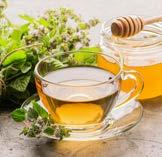

SALVES
Chop 4 ounces of skinsafe dried herbs and add to a quart-size mason jar. Next add 8 ounces of an organic carrier oil, such as almond, coconut, olive or jojoba. Place the jar in a crockpot water bath, and heat on the “warm” setting (about 110 degrees) with the lid off for 12 to 24 hours. Cool the oil, strain through cheesecloth and store in a mason jar. To make salve, melt in 1 ounce of beeswax before storing.
FRAGRANT HERBAL BATH BAGS

Soak in a fragrant herbal bath for relaxation, skin health and more. Add 3–4 ounces of dried herbs to your bath (use a reusable bath bag to avoid clogs). Try calendula, German chamomile, lemon balm and peppermint, or experiment with your own herbal mixes.

THAT YOU’VE GROWN YOUR WELLNESS HERBS, IT’S TIME TO USE THEM!
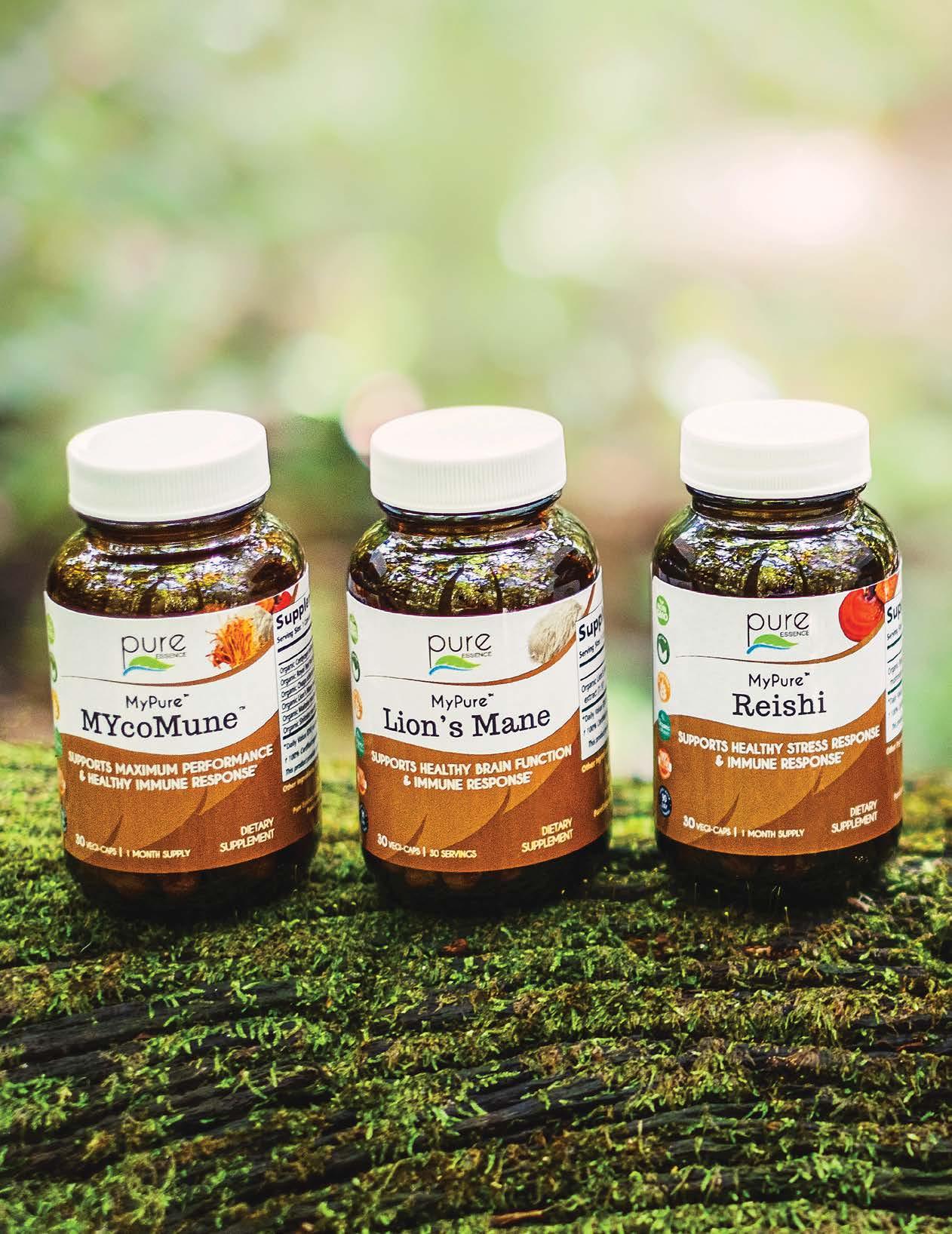
The world’s great holistic systems have used mushroom fruiting bodies for centuries to support immunity, energy, stamina, brain health, sexual function, longevity and more.*
Because of this, mushroom supplements are popping up everywhere. Yet, many “mushroom products” are not mushrooms at all. They’re mycelia grown on grain, which contain up to 70% starch.
MyPure™ Mushrooms are the real deal. 100% Organic, non-GMO, fruiting body extracts.


Every lot contains lab assured levels of beta (1,3) (1,6)-D-Glucans. And absolutely no starch fillers!




MyPure™ Mushroom original formulas are up to 10 times stronger than typical grain-grown mycelia or raw mushroom powders. Our new 4X versions are stronger still.
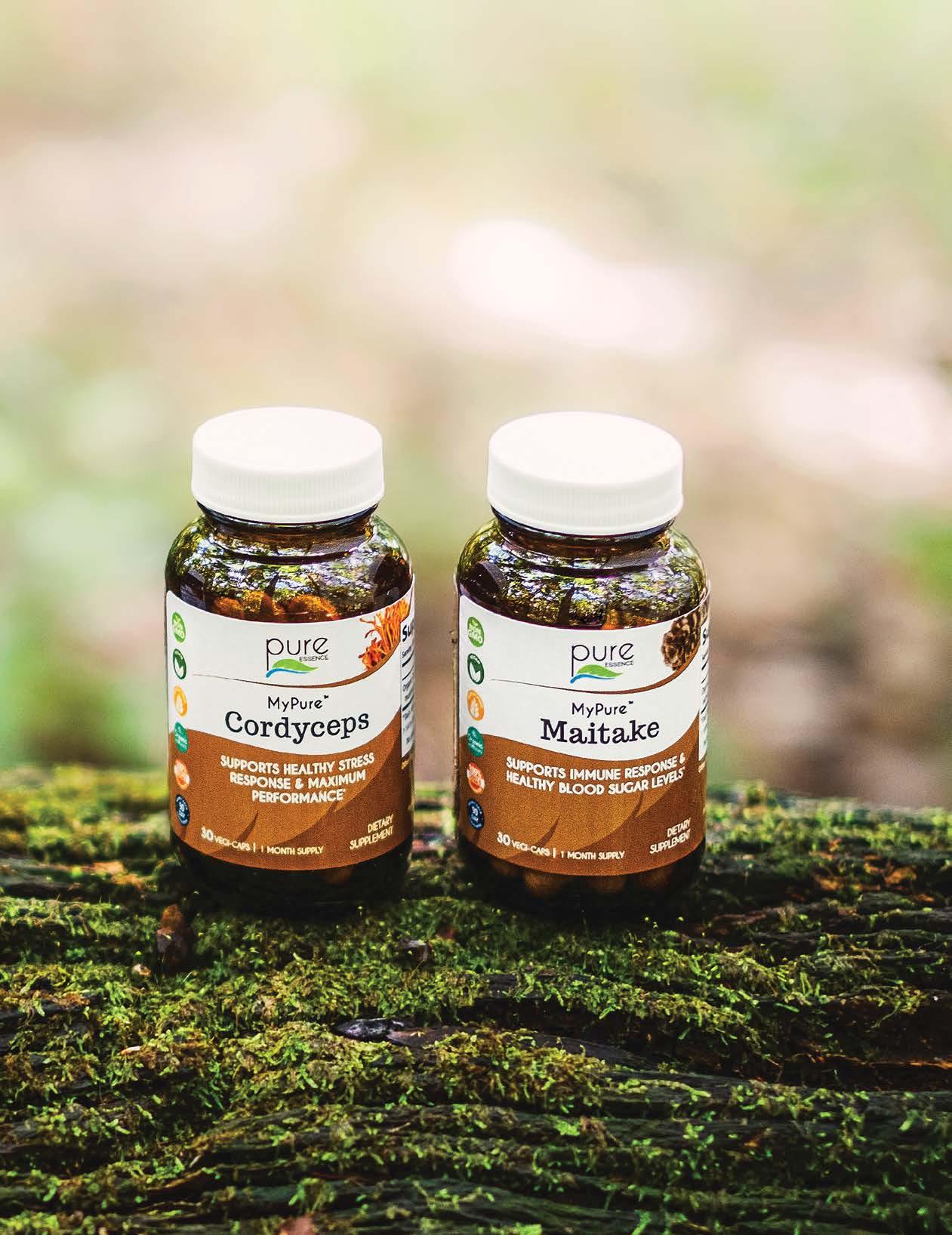
If you want real mushroom benefits, you need real mushroom nutrition. And, if you need real mushroom nutrition, you need MyPure™ Mushrooms.
MyPure™ Mushrooms — from Pure Essence.
 by JERY COCHERN
by JERY COCHERN
Following this definition, we experience health as a manifestation of energy, strength, calm and acceptance. The healthier we are, the more positive our attitude toward life and other people will be; the more respect and tolerance for different opinions we’ll have; and the more we see ourselves as small but crucial parts of the universal creation rather than unquestioned centers of our own little worlds.
Now, if you’re actually human, and just a little bit honest, you’ll realize that this doesn’t sound much like you. Instead, we all face a mess of stress that leads us far from that place. We’re bombarded by a neverending stream of events, situations and circumstances. Yet, instead of seeing stress as the killer it is, many wear it like a medal, taking pride in having more stress than others.
When we think of stress, we typically see it as the result of an event that makes us anxious, fearful or short tempered. Where health is concerned, it’s much more.
Stress floods the body with abnormal levels of hormones. It restricts blood vessels, increasing your blood pressure and heart rate. It increases blood sugar, respiration and perspiration. It undermines digestion, immune response and other vital functions.
The purpose of the human stress response is to increase energy so that we can fight more fiercely or flee more quickly from danger. Yet, while it might increase our chances of surviving an immediate threat, it also initiates processes that trigger massive oxidation and inflammation, thus setting the table for countless health concerns.

Heart disease
Asthma
Obesity
Diabetes
Headaches
Depression and anxiety
Gastrointestinal issues
Alzheimer’s
Insomnia
Nausea
Painful periods (in women)
Accelerated or premature aging
Early or premature mortality
Knowing that stress undermines health, and realizing we can’t completely avoid it, it’s important to have a healthy stress response. Among our best tools for supporting this response are herbs known as Rasayanas, Superior Tonics and adaptogens.
Rasayanas and Superior Tonics are virtually interchangeable. Because they come from different cultures, they have different names, with Rasayana being an Indian word meaning “way of life” or “path of essence,” and Superior Tonic being an English translation used to classify a select group of herbs from Tibet, Korea, Japan and China. Adaptogens all share the virtues of Rasayana and superior herbs, but have the added characteristic of being “double directional.”
Over the course of more than 5,000 years, Asian herbal traditions have used over 25,000 plants as medicines. Of these, only about 30 Indian herbs are true Rasayanas and about 25 qualify as superior. Depending on whose list you use, there are from nine to 50 adaptogens.
In recent years, modern medicine has, at least outwardly, adopted a holistic concept of health. This concept defines health as a positive balance between physical, mental, emotional, social and spiritual well-being.
The HEALTHIER we are, the more POSITIVE our attitude toward life and other people will be.PHOTO BY RIDOFRANZ / ISTOCK / GETTY IMAGES PLUS
MEMORY, COGNITION, FOCUS
Ashwagandha, bacopa, gotu kola, ginseng and rhodiola support brain function and support healthy levels of brain-derived neurotrophic factor (BDNF).
IMMUNE FUNCTION
Ashwagandha, astragalus, amla, holy basil, tinospora (guduchi) and ginger support a healthy immune response.

BENEFICIAL SLEEP PATTERNS
Bacopa, myristica and cardamom support healthy sleep patterns.
ENERGY
Ashwagandha, holy basil, shilajit, ginseng and gotu kola support healthy energy levels.
ADRENAL HEALTH
Ashwagandha, holy basil, asparagus root and cordyceps support adrenal health.
To qualify as Rasayana and Superior Tonic, an herb must:
❶ Be safe for virtually anyone to take as recommended on a daily basis.
❷ Provide strong support for at least one organ system or body function.
❸ Help build vital energies.

To be an adaptogen, an herb must also possess “double directional” activity, meaning that it can either increase or decrease a given system’s activity depending on need. These groups of herbs contain unique phytochemicals not found in any other plants. These phytochemicals help you deal with stress in ways no other nutrients can. Because stress in the modern world is far beyond levels we’re meant to encounter, these herbs can be of tremendous benefit. However, as good as they are for stress, that’s just the beginning. When combined correctly, the benefits these herbs offer are limitless.
Above, we mentioned that some adaptogens have a “double directional” nature. In other words, they regulate body systems depending on need.
For instance, several herbs can stimulate immune response. This could be good when infections strike, but bad if you deal with autoimmune conditions. Other plants do just the opposite. Immune adaptogens can increase or decrease immune function, depending on need. Thus, they are the safest of all herbs.
PHOTO BY CHOREOGRAPH (RUNNING TRIO) AND RAWPIXEL (GROUP CIRCLE) / ISTOCK / GETTY IMAGES PLUSIf Rasayana, superior and adaptogen herbs sound a lot alike, congratulations! You passed the test! The truth is that these herbs differ more in terminology than substance. Where Ayurveda refers to seven dhatus (types of body substances), traditional Chinese medicine speaks of five organ systems. Where Ayurveda says, “prana,” traditional Chinese medicine uses “Qi.” The bottom line is that Rasayanas, superior herbs and adaptogens are similar in nearly every important way. Many see their benefits as nearly miraculous.
RASAYANA FROM INDIA: Ashwagandha, turmeric, bacopa, gotu kola, asparagus root (shatavari), holy basil (tulsi), Indian morning glory (shankhpushpi), amla, ginger, etc.
SUPERIOR TONIC FROM TIBET, KOREA, JAPAN, CHINA: Ginseng, astragalus, reishi mushrooms, cordyceps mushrooms, schisandra, rehmannia, etc.
ADAPTOGEN MOSTLY FROM ASIA: Ashwagandha, ginseng, holy basil, rhodiola, amla, schisandra, etc.
These lists are by no means complete, but offer a starting point of where to look for help. Between Rasayanas, Superior Tonics and adaptogens, we have an amazing pharmacopeia of plants to help promote health as defined in our opening paragraph. In this world, of course, true perfection is not possible. We can, however, greatly improve our individual health profiles. As we do, we build a better world. Because health, again, includes mental, emotional, social and spiritual aspects.
Supporting a healthy stress response with Rasayanas, Superior Tonics and adaptogens doesn’t just feel good, it unleashes your personal potential for wellness and longevity. Still, herbs are just a beginning. Ayurveda is the granddaddy of all holistic health systems on earth. It includes proactive lifestyle practices that work with herbs to further fight stress and promote inner balance. These include massage, application of oils, breathing exercises and meditation.
One of the questions I get most often about Ayurveda is if it is acceptable for Christians. This is understandable, because the transcendental and vocal meditations of Asia are associated with Hindu and Buddhist worldviews. Meditation, however, is also a strong biblical concept. For example, Joshua 1:8 says, “Keep this book of the law always on your lips; meditate on it day and night …” Psalm 19:14 reads, “May the words of my mouth and the meditations of my heart be acceptable in your sight …” Meditation, then, is simply a tool to focus the mind. According to Hebrew and Christian scripture, meditations focused on God are among the highest forms of worship.

Put simply, if we’re to enjoy radiant health, we must minimize stress. Rasayanas, superior herbs and adaptogens are nearly miraculous in how helpful they can be. Their benefits are amplified still more when we allow meditation and prayer to multiply their power. ■


Between RASAYANAS, SUPERIOR TONICS and ADAPTOGENS, we have an amazing pharmacopeia of plants to help promote health.

“Bad” estrogens can trigger menstrual issues, breast tenderness, menopausal complaints and more!




Di-indolylmethane (DIM) helps you metabolize more healthy estrogens and fewer less-healthy ones.
DIM occurs naturally in cauliflower, broccoli and cabbage. But, you won’t get enough unless you eat a pound of them — every day.
DIM-D™ blends DIM with green tea, lycopene, calcium D-glucarate and vitamin D3 to support estrogen metabolism and breast health as no other supplement can.*
DIM-D™ — the very best in breast support.*

Some Retailers offer Breast-D™ instead of DIM-D™. They are identical formulas.

 By LISABETH FAUBLE
By LISABETH FAUBLE
Candida is a type of yeast that is naturally present in the gut, mouth, skin and vagina. While it is always present, it causes problems only when it grows beyond limits your body can handle.
When this happens, Candida releases toxins that it produces as part of its natural life process into your system, which triggers all kinds of unpleasant symptoms. Beyond vaginal yeast infections, systemic Candida overgrowth may be associated with brain fog, otherwise unexplained weight gain or loss, indigestion, rashes, high blood sugar levels and other concerns. These discomforts can range from mildly annoying to nearly debilitating.
There are many Candida species, but Candida albicans is the leading fungal pathogen for causing yeast infections (also called candidiasis). Men can get Candida infections, but they are far more common in women. At least 70% of all women have experienced the symptoms of a yeast infection at some point in their lives. It is the second most common vaginal infection behind bacterial infections, and about 1.4 million people visit the doctor for candidiasis every year.1
Candida overgrowth may occur due to the use of medications such as antibiotics, birth control pills and corticosteroids. This is because such drugs can deplete your probiotics, the healthy bacteria that help keep Candida and other pathogenic organisms in check. High estrogen levels and poor immune response can also contribute to Candida overgrowth, as can deficiencies of iron and other nutrients. Candida problems are also common during pregnancy.2
If you think you have a yeast infection, see your healthcare professional. To check for swelling and discharge, your doctor may do a pelvic exam. He or she might collect a sample of vaginal discharge with a cotton swab and send it for microscopic examination by a laboratory technician to determine if Candida albicans is the issue.
Since Candida is a fungus, the most common treatments are antifungal herbs. However, these herbs have limitations, with fungal resistance being the most significant.
Candida is a living organism that carries out its lifesustaining functions inside your body. Among these functions is its immune response to attack against it.
The antifungal compounds from herbs, when you take them, are inert, meaning that they are fixed. They cannot change. When exposed to these compounds, Candida’s immune system activates by making chemicals that block the antifungals’ actions. Antifungals kill Candida, but as some cells are dying, others are adapting. Those that remain eventually “figure the antifungal out.” This results in stronger strains of Candida and antifungal herbs that simply stop working.
Candida can develop resistance rather rapidly when exposed to antifungals. Researchers report that this
Bullies are never as tough as they seem. You just have to fight back. With Candida, that means Candex™.
Candex™ is a blend of enzymes that supports gut balance by encouraging healthy yeast levels.*




It’s super easy to use:
• No major changes in diet

• Little if any die-off reaction
• Start feeling better in 10 days or less* When you lose your balance, reach for Candex™!*


rapidly growing fungal resistance is a concern for modern healthcare.3

Antifungals may also come with side effects, including a Jarisch-Herxheimer reaction (JHR, or dieoff reaction). In JHR, dying microorganisms release toxins that unleash a whole new range of miserable symptoms, including chills, headaches, muscle aches, fever and apprehension. In other words, you have to feel a whole lot worse before you feel even a little better.4
Virtually all organisms use sugar for energy. Candida is no exception. Diets that are rich in sugars may encourage Candida overgrowth. On the other hand, Candida can, in the absence of sugar, morph into a hyphal state — a sharp, rod-like shape that can penetrate the walls of the colon, enter the bloodstream and colonize other parts of the body — to find it.
A good Candida diet will avoid as much simple sugar as possible, but it’s not necessary, or even wise, to eliminate carbs altogether. You can eat plenty of fruits and vegetables. But, add lots of good protein and fats, too, and try to include some probiotic-rich foods.
Science generally accepts that healthy probiotic populations in the gut can help keep Candida yeasts from growing beyond normal levels. Foods that are rich in probiotics, including kimchi, sauerkraut, pickles, kefir, kombucha and yogurt, are great additions. However, be careful to avoid yogurts with added sugars.
Probiotic supplements may also be helpful. An animal study showed that the yeast-based probiotic, Saccharomyces cerevisiae, reduced the spread of Candida.5 A human clinical study showed that daily consumption of yogurt that contains Lactobacillus acidophilus may help with Candida-related vaginitis.6 Researchers suggest that several probiotic strains may kill bacteria and yeast within the vagina and help restore a healthy microbiome balance.7
Enzymes present another natural way to manage Candida populations. Unlike the chemical methods employed by antifungals, enzymes work mechanically: They break down complex substances into simpler ones.
A cell is a structure that contains the equipment and chemicals for the organism to carry out its metabolic functions. Without a cell wall or membrane, the cell has no organization, making it impossible for the equipment and chemicals to work.
Candida’s cell wall is comprised mostly of chitins, beta-glucans, mannoproteins and glycoproteins. Specific enzymes can digest these materials. If enough of these enzymes make contact with Candida, they may degrade the cell wall to such an extent that it cannot survive.
One of the reasons Candida is such a pest is that it produces biofilms. These are like shields that Candida uses to hide from the immune system. Because Candida biofilms are made from the same materials as Candida cells, the same enzymes that digest the cells can work against them. Many people who have used enzymes to help manage Candida say they also avoid the unpleasant JHR dieoff reactions associated with both natural and synthetic antifungals.
While all raw foods contain digestive enzymes, those that are cooked do not. Enzymes from foods are also unlikely to be strong enough or exist in the right proportions to help manage Candida. Specific dietary supplements supply enzymes that are curated, combined specifically to help support healthy Candida populations.
Candida yeast is everywhere. It will always be present. The key is to keep it at levels your natural immune response can handle. Antifungal herbs may help temporarily, but are unlikely to achieve your longterm goals. Many people have found enzymes to be an effective management tool, but it’s also important to support your immune system and follow a sensible diet.
As with all things, some of us have greater natural resistance to Candida than others. But, by maintaining a constant awareness and adopting the right lifestyle practices, you can keep your Candida issues to whatever minimum your natural constitution allows. ■
Cordyceps is an absolute herbal superstar. It supports healthy energy levels and immune response. Athletes use it to build power, vigor and stamina.*

But, for real power, you need real Cordyceps — in real amounts.
That’s why you’ll want MyPure™ Cordyceps 4X.


Through the world’s most potent Cordyceps extracts, each capsule of MyPure™ Cordyceps 4X delivers the equivalent of 22,000 mg of fresh Cordyceps power. Up to 40 times more than others.
It’s organic, non-GMO and contains no starch fillers. Just whole, pure Cordyceps.



MyPure™ Cordyceps 4X — for the power you need.*

Researchers suggest plant oils supply phytochemicals with antimicrobial, inflammation-soothing and antioxidant properties that make them effective skin barrier therapies.1 In natural skin-care regimens, essential oils are used to help with anti-aging, dryness, redness, flaking, irritation, healing, acne and many other concerns.
Safety first: Essential oils are strong and must be used carefully. Not all essential oils are appropriate for topical use. Some citrus-based oils may cause irritating phototoxicity. Other oils, such as clove, cinnamon, oregano and thyme, should never be applied to the skin.
Even for skin-safe essential oils, a patch test is advisable. Apply two drops of diluted oil to the inside of your forearm, cover with a bandage, and then wait 48 hours to evaluate any sensitivities or allergic reactions.
It is important to dilute topical essential oils with carrier oils, typically at a concentration of 1% for topical applications. This amounts to one drop of essential oil in every teaspoon of carrier oil.
So which essential oils are best for skin? Let’s start with the most popular for skin health: lavender oil. Known for its relaxing scent, lavender essential oil has also been shown in research to have skinsupportive properties, including boosting collagen synthesis, soothing inflammation and fighting microbes. Researchers suggest it may promote skin healing and exert anti-aging activity.2

You’ve heard of essential oils for aromatherapy, but did you know that these botanical extracts are also accessible and relatively inexpensive options for skin care?PHOTO BY POLINA LEBED / ISTOCK / GETTY IMAGES PLUS
Tea tree oil is another skin-healthy choice. Researchers have suggested it has antimicrobial and inflammation-soothing properties; one early study found that a topical tea tree-oil gel was an effective remedy for mild to moderate acne.3
Eucalyptus oil is associated with respiratory wellness, but research has also shown that its essential oil promotes skin regeneration and hydration, potentially improving dry skin issues.4

Researchers have suggested that rose hip oil, due to its rich antioxidant content, appears to be a promising aid in reducing signs of aging including wrinkles, dryness and spots.5

Frankincense oil is another researchbacked essential oil. Its active phytochemicals called boswellic acids possess inflammationsoothing activity. Frankincense oil has been shown to significantly improve fine lines, roughness, photoaging and elasticity in skin.6
And finally, pomegranate oil has been noted by researchers for its antioxidant phytochemicals and ability to protect the skin against sun-induced damage.7

Carrier oils, also known as base oils, are plant extracts — typically coldpressed from seeds or nuts — that are rich in skin-healthy fatty acids, vitamins and minerals. Use them to dilute essential oils for topical skin applications. Top choices include sweet almond oil, jojoba oil, grapeseed oil and avocado oil. Organic carrier oils are preferred.

There are many other essential oils that can help the skin beyond those mentioned in this article. Do your own research to discover more options for your specific skin concerns. In addition, keep in mind that essential oils can be blended to further customize your natural skin support regimen. ■
In foods, vitamin C is not just ascorbic acid. It’s ascorbic acid surrounded by rutin, factor F, factor P and other compounds. Countless health experts believe whole vitamin C is healthier than ascorbic acid alone. Now, you can get just that with Whole-C™.

Camu-camu is a berry that grows deep in the Amazon rainforest. Whole-C™ delivers 120 mg of whole food vitamin C from this berry, with another 500 mg of supporting fruits and sprouts, as well as absorption enhancing BioPerine®.
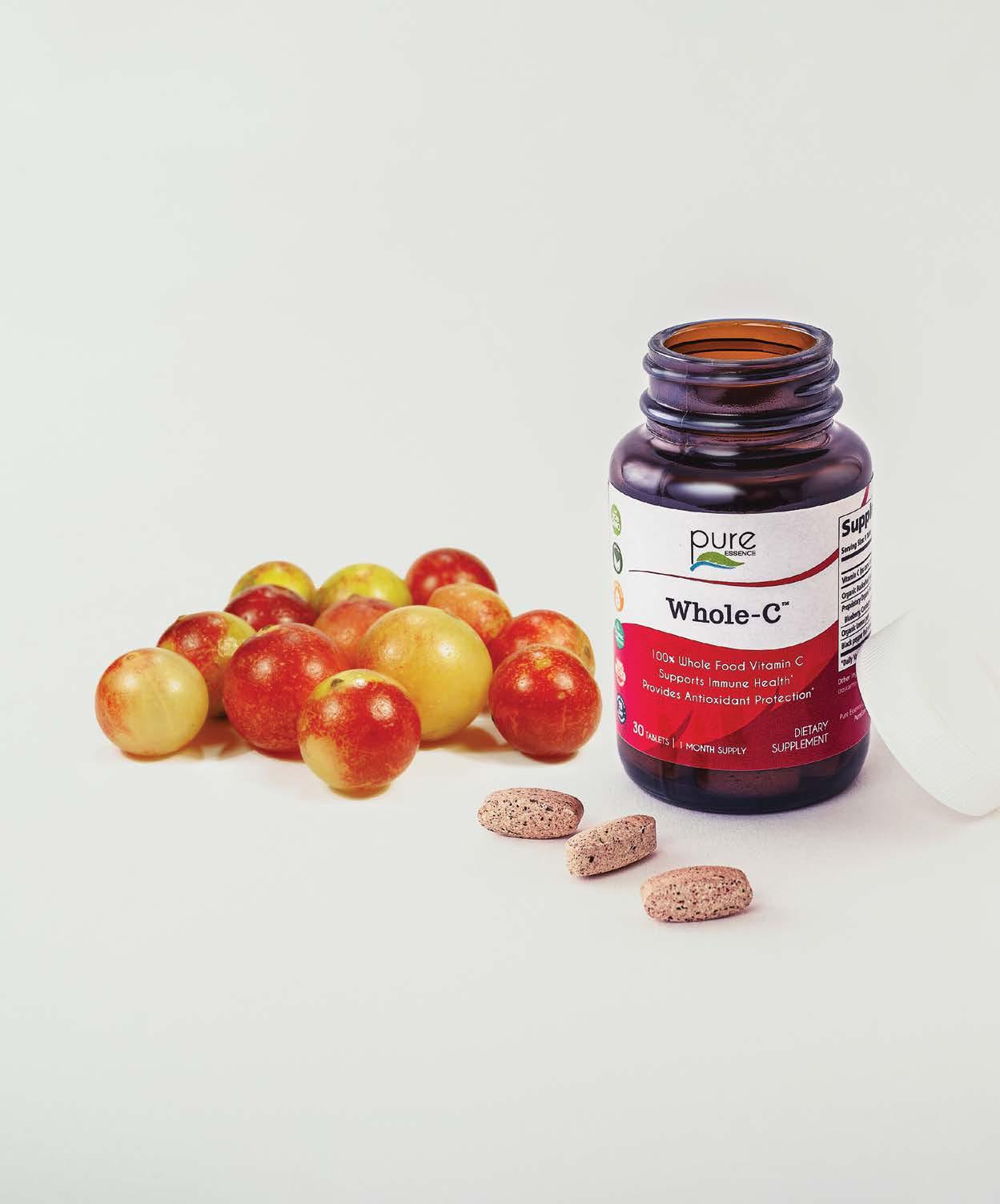
Whole-C™. Pure. Natural. Holistic. The way you want it.






Turkey tail has been used for centuries to support digestion, gut health, liver health and a healthy immune response.*


But, for turkey tail benefits, you need a real dose of real turkey tail mushrooms. You need MyPure™ Turkey Tail 4X!*

It’s hot-water extracted. It’s 100% Organic. It’s non-GMO. It contains NO starch fillers. And each capsule equates to at least four capsules of other products.


MyPure™ Turkey Tail 4X — Pure, turkey tail fruiting body mushrooms, and nothing else.
